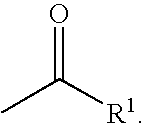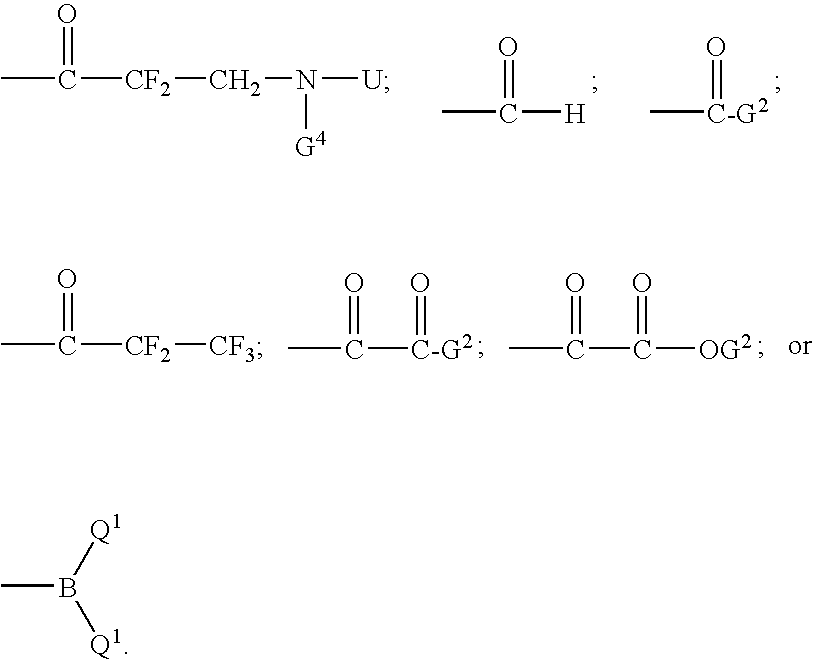Inhibitors of serine proteases, particularly hepatitis c virus ns3 protease
a serine protease and inhibitor technology, applied in the direction of peptides, drug compositions, peptides, etc., can solve the problems of no serine protease inhibitors available as anti-hcv agents, no broad-based treatment for the debilitating progression of chronic hcv, and no current understanding of hcv to achieve satisfactory anti-hcv agents or treatments
- Summary
- Abstract
- Description
- Claims
- Application Information
AI Technical Summary
Problems solved by technology
Method used
Image
Examples
example 1
[0213]Numerous amino acids for use in the synthesis of peptidyl and peptidomimetic compounds of this invention may be purchased commercially from, for instance, Sigma Chemical Company or Bachem Feinchemikalien AG (Switzerland). Amino acids that are not commercially available can be made by known synthetic routes (“Kinetic Resolution of Unnatural and Rarely Occurring Amino Acids: Enantioselective Hydrolysis of N-Acyl Amino Acids Catalyzed by Acylase I”, Chenault, H. K. et. al., J. Am. Chem. Soc. 111, 6354-6364 (1989) and references cited therein; “Synthesis of β-β-Unsaturated Amino Acids by the Strecker Reaction, Greenlee, W. J., J. Org. Chem. 49, 2632-2634 (1984); “Recent Stereoselective Synthetic Approaches to Beta-amino Acids”, Cole, D. Tetrahedron 50: 9517 (1994); “The Chemistry of Cyclic Alpha Imino Acids”, Mauger, A. B; Volume 4 of “Chemistry and Biochemistry of Amino Acids, Peptides, and Proteins”, Weinstein, B. editor, Marcel Dekker (1977); “Recent Progress in the Synthesis a...
example 2
[0216]Compounds 1-26 (Table 1) were prepared as described in scheme 1.
Synthesis of 301-306
[0217]Step A. Synthesis of 301. 4-Methyl Benzhydrylamine resin (1.05 mmol / g, 20.0 g) was placed in a sintered glass funnel and washed with dimethylformamide (3×75 mL), 10% (v / v) diisopropylethylamine (DIEA) in dimethylformamide (2×75 mL) and finally with dimethylformamide (4×75 mL). Sufficient dimethylformamide was added to the resin to obtain a slurry followed by 300 (8.0 g, 20.8 mmol, prepared from (2S) 2-(t-Butyloxycarbonylamino)-butyraldehyde according to A. M. Murphy et. al. J. Am. Chem. Soc., 114, 3156-3157 (1992)), 1-hydroxybenzotriazole hydrate (HOBT-H2O; 3.22 g, 21.0 mmol), O-benzotriazole-N,N,N′,N′-tetramethyluronium hexafluorophosphate (HBTU; 8.0 g, 21.0 mmol), and DIEA (11.0 mL, 63 mmol). The reaction mixture was agitated overnight at room temperature using a wrist arm shaker. The resin was isolated on a sintered glass funnel by suction filtration and washed with dimethylformamide (...
example 3
[0222]Compounds 27-29 (Table 1) were prepared as described in scheme 2.
[0223]Step A. Synthesis of 301. See Step A, Scheme 1 methodology.
[0224]Step B. Synthesis of 308. Resin 301 (6.0 g, 0.65 mmol / g, 3.9 mmol) was swelled in a sintered glass funnel by washing with dichloromethane (3×50 mL). The Boc protecting group was then cleaved with 50% (v / v) TFA / dichloromethane (50 mL) for 10 min (intermittent stirring) and then for 30 min with fresh reagent (50 ml). The resin was then washed with dichloromethane (3×50 ml), dimethylformamide (2×50 mL), 10% DIEA / dimethylformamide (v / v) (2×50 mL), and finally N-methylpyrrolidone (3×50 mL). After transferring the resin to a 100 mL flask, N-methylpyrrolidone was added to obtain a slurry followed by 307 (2.83 g, 8.0 mmol), HOBT.H2O (1.22 g, 8.0 mmol), HBTU (3.03 g, 8.0 mmol) and DIEA (4.2 mL, 24 mmol). The reaction mixture was agitated overnight at room temperature using a wrist arm shaker. The resin work-up and capping with 20% (v / v) acetic anhydrid...
PUM
| Property | Measurement | Unit |
|---|---|---|
| temperature | aaaaa | aaaaa |
| width | aaaaa | aaaaa |
| pharmaceutical compositions | aaaaa | aaaaa |
Abstract
Description
Claims
Application Information
 Login to View More
Login to View More - R&D
- Intellectual Property
- Life Sciences
- Materials
- Tech Scout
- Unparalleled Data Quality
- Higher Quality Content
- 60% Fewer Hallucinations
Browse by: Latest US Patents, China's latest patents, Technical Efficacy Thesaurus, Application Domain, Technology Topic, Popular Technical Reports.
© 2025 PatSnap. All rights reserved.Legal|Privacy policy|Modern Slavery Act Transparency Statement|Sitemap|About US| Contact US: help@patsnap.com



